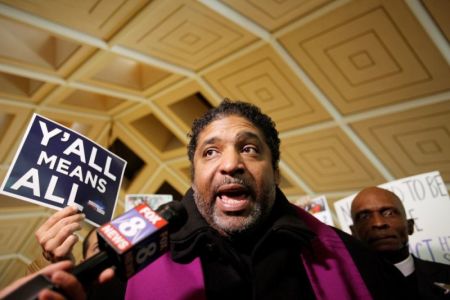When Christian Social Justice Activists Ignore Social Justice

A blogger in Sojourners defends Christian social justice activism and denies it's liberal or secular:
Many Christians are wary of participating in social justice because of a deep-rooted fear of being labeled "liberal," "progressive," or "secular." They don't want to be associated with "secular" movements, and are uncomfortable delving into issues that go beyond their cultural comfort zones.
But the Bible tells us that Jesus cared deeply about the social causes around him.
Some conservative critics of Christian social justice activism reject its identity group politics and victimology. They prefer to look at all people as equally needing the Gospel without focusing on racial, ethnic, and economic distinctives.
But the blogger responds:
While God does love everyone and all believers are united in Christ, this doesn't negate the fact that we have a unique cultural identity and upbringing and are called to recognize the marginalized, help the oppressed, and avoid rejecting their significance by denying their identity or ignoring their plight.
And the blogger concludes:
By acknowledging and actively participating in the #blacklivesmatter movement, addressing racism, immigration, gender equality, and a litany of other issues, you are following in the steps of Jesus.
The blogger is correct to note Christianity's special concern for persons who are neglected, oppressed and persecuted. In God's fulfilled Kingdom the last shall be first and the first shall be last. The church if faithful strives to ennoble all who have been marginalized and dehumanized.
But this blog, although denying social justice is liberal, is not very encouraging or persuasive to someone who's not liberal. Christian social justice activism almost always focuses on racial, gender, poverty and immigrant injustice. Its intentions are often good. Sometimes but not always the results are helpful. But rarely does Christian social justice activism focus on concerns outside the parameters of the secular left.
Most Christian social justice activism doesn't discuss the unborn, who clearly are vulnerable. Christianity has always been pro-life, so why the virtual silence? The aged and terminally ill who are increasingly threatened by euthanasia and assisted suicide are also vulnerable yet largely ignored by social justice activism.
Christian social justice activists ignore and sometimes even reject defense of traditional marriage and family, along with traditional sexual morality. But Christianity has from the start understood that the protection of children and the dignity of women necessitate stable marriages and families, undergird by chastity. Illegitimacy and divorce are leading contributors to material and spiritual poverty. So why the silence from social justice advocates?
Social justice activism obsesses over privilege, and it assumes Christians are privileged, which has been historically true in the West. But it's not true in most of the world, and true less and less in the West. Hundreds of millions of Christians globally contend with persecution or restrictions on their faith. Social justice advocates are almost always silent. Why?
And even in the West some Christians, often economically vulnerable, face prejudice and discrimination from big corporations, government and other powerful entities, especially for their views on sexuality. But social justice advocates are either silent or contemptuous.
Social justice activism is rightly focused on poverty but mostly concerned about expanding the welfare state, often if unintentionally at the expense of the church and civil society. This prescription of income redistribution implies humans are primarily material and not spiritual beings. Fifty years of rising illegitimacy and family disintegration owe partly to the welfare state. And the chief victims are children lacking mothers and fathers married to each other, about which social justice activism is silent.
Distortingly, social justice activism embraces a secular demonization of America and the West as uniquely oppressive. But Christianity teaches all humanity is equally fallen and needful of redemption. Social justice activism largely acquires its laudable desire for human equality from the Western political tradition, yet it is ungrateful.
A better informed social justice activism would confront American and Western sins while also admitting blessings. Most of the world lacks reliable rule of law or consistent protections of human rights. Tormenting, imprisoning and murdering dissidents remains all too common globally, about which social justice activism is largely indifferent.
Within the lifetimes of many persons now alive multiple societies around the world have conducted genocides murdering tens of millions. Yet social justice activism typically finds fault mainly if not exclusively with America, which had often been the counter to those genocides.
Christian social justice activism is usually hostile to America's military strength, upon which much human freedom and defense of human decency depends. It's negative on law enforcement, which along with military protection is God's primary vocation for the state.
Police and military injustices and abuses can't be properly critiqued outside affirmation of their divine calling. All persons and human institutions are fallen, and therefore must operate within constraints. But social justice activism is often utopian, damning some institutions while demanding almost total power for others.
True Christian social justice seeks racial and economic justice. It wants dignity for all. So it also includes defending the unborn, the aged and terminally ill, marriage and family, religious freedom, civil society, ordered liberty, and private property. It's about God-ordained human creativity & dignity, the public good, gratitude, duty, and not just grievance, entitlement and identity politics.
If faithful, comprehensive and realistic, Christian social justice seeks to redeem persons and reform society while always recognizing all are fallen. Only God in Christ will ultimately reclaim and perfect the world. If social justice activists more intentionally incorporate holistic Christian teaching into their advocacy, non liberals will be more persuaded of their cause.
Originally posted at Juicy Ecumenism.





















